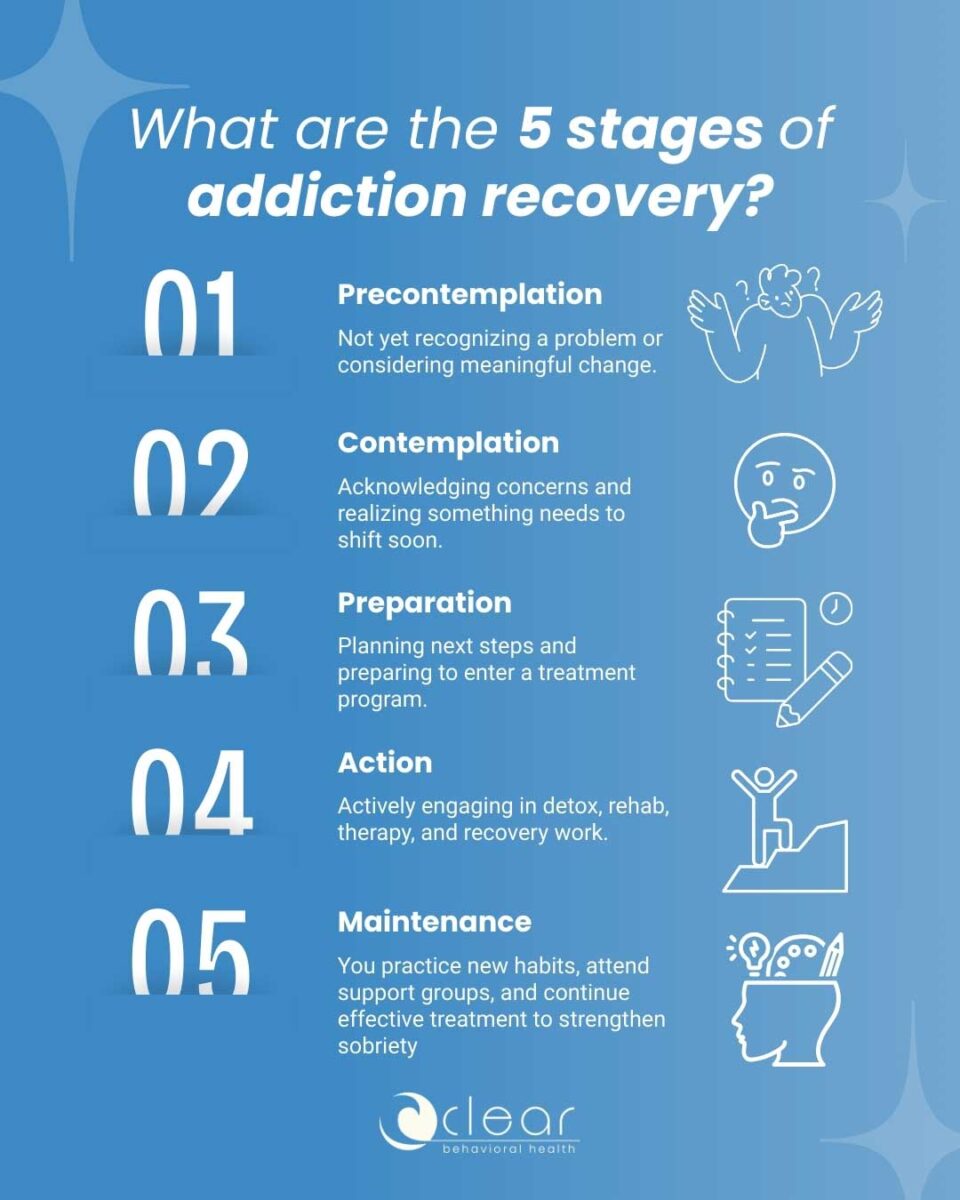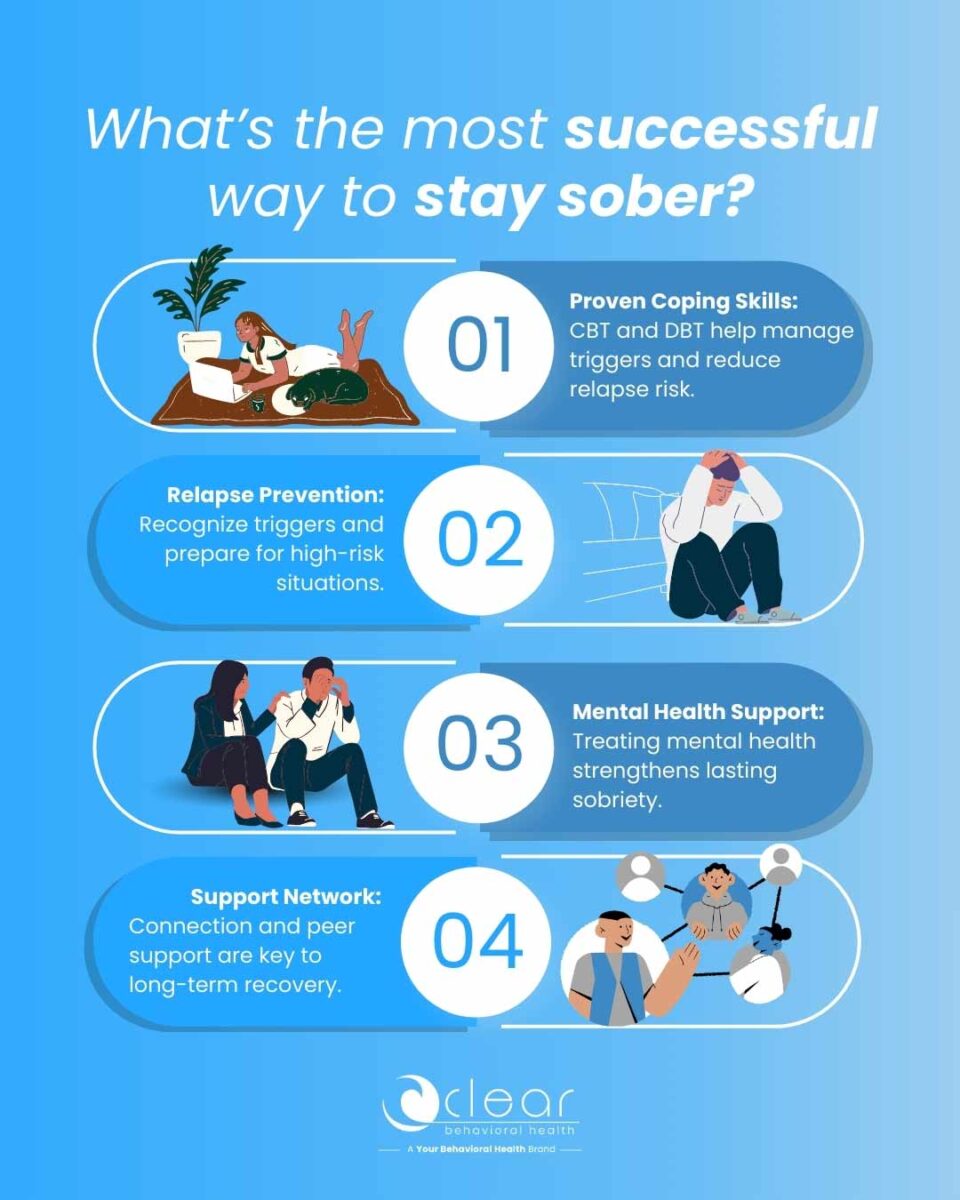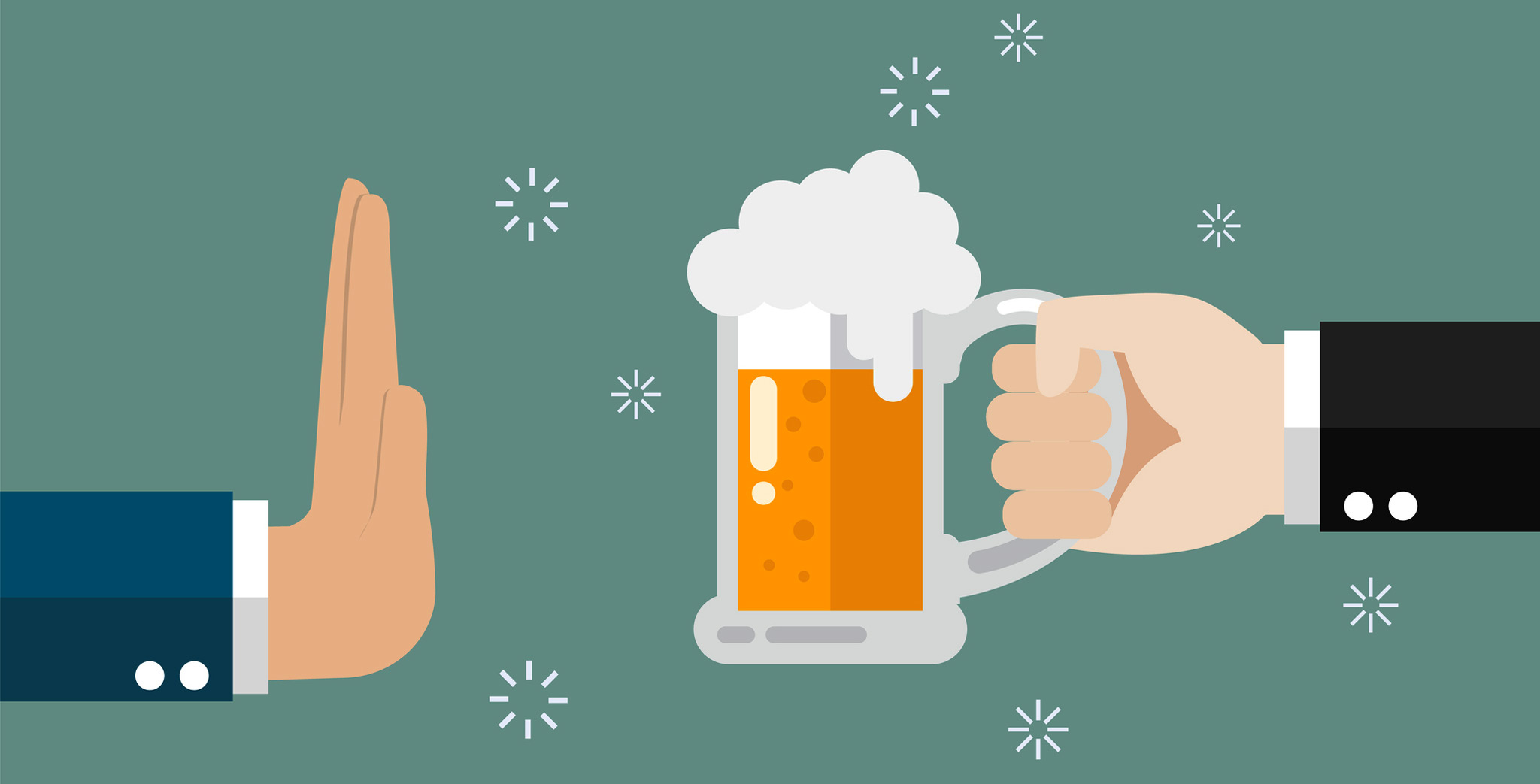Staying sober can feel steady one day and exhausting the next. You might be doing everything “right” and still feel pulled back toward old habits, familiar stress relief, or the comfort of substances that once helped you cope. Thankfully, there are things you can do right now to get you out of that headspace and back on the right track.
Beyond avoiding drugs and alcohol, learning how to stay sober is about building a life that supports your recovery, protects your mental health, and gives you reasons to keep choosing sobriety even when it feels uncomfortable. With the right support, tools, and strategies, long-term sobriety is possible, and it can become something you truly want, not just something you’re trying to maintain.
What happens when you get sober?
Getting sober usually starts with reducing or stopping drug or alcohol use. If your body is physically dependent on alcohol or drugs, the safest first step is often medical detox, where withdrawal symptoms are monitored and treated under medical supervision to reduce health risks [1].
After detox, many people benefit from structured addiction treatment. This may include:
- Inpatient rehab, which provides 24/7 support, therapy, and structure
- Outpatient rehab programs, which allow you to receive treatment while continuing work, school, or family responsibilities
Treatment helps you understand the root causes of addiction, whether that’s alcohol addiction, drug addiction, another substance use disorder, or a pre-existing mental health condition that led you to substances in the first place. Rehab also teaches practical skills you’ll use long after treatment ends. Research consistently shows that combining medical care, therapy, and ongoing support improves recovery outcomes and reduces relapse risk [2].
What are the benefits of sobriety?
Choosing sobriety can positively impact nearly every area of your life. Many people notice benefits such as:
- Improved physical health and energy
- Better sleep and emotional regulation
- Stronger relationships with friends and family
- Reduced symptoms of anxiety and depression
- Greater stability in work, school, and daily routines
Avoiding alcohol and drugs allows your brain and body to heal over time. Studies show that sustained sobriety improves mental health outcomes and overall quality of life, especially for people recovering from alcohol use disorder or substance abuse [4].
Help is here. Reach out to our addiction treatment experts to explore your next step.
What are the 5 stages of recovery?
Recovery is a lifelong process, not a single decision. Many people move through five common stages as they work to achieve sobriety and remain sober:
- Precontemplation – Not yet ready to change
- Contemplation – Acknowledging concerns about substance use
- Preparation – Planning how to get sober
- Action – Actively engaging in treatment and change
- Maintenance – Applying skills to maintain sobriety long-term

Understanding these stages helps normalize setbacks. Relapse can seem like failure, but that’s not at all what it is. If anything, it signals the need for stronger support, new coping strategies, or adjustments in your recovery plan [3].
Related: Addiction Recovery Stages: Milestones on the Path to Freedom
What is the most successful way to stay sober?
There’s no single formula, but research and clinical experience point to several strategies that consistently help people stay sober.
Build a strong support network
Recovery works best when you’re not doing it alone. Support can come from supportive friends, family, therapists, and support groups. Programs like AA (Alcoholics Anonymous), NA (Narcotics Anonymous), and other peer-led groups create accountability and connection, which are both critical for long-term recovery [3].
Learn evidence-based coping skills
Therapies such as cognitive behavioral therapy (CBT) and dialectical behavior therapy (DBT) help you recognize triggers, manage stress, and replace old habits with healthier responses. These coping skills are proven to lower relapse risk [3].
Related: Unlocking the Benefits of CBT for Substance Abuse Recovery
Plan for relapse prevention
Relapse often starts emotionally or mentally before substance use occurs. Identifying potential triggers, creating an exit plan for high-risk situations, and knowing who to contact for support are essential tips for staying sober [5].
Related: Relapse Prevention Plan: Navigating Crisis During the LA Fires
Support your mental health
Stress, depression, and mood changes can make sobriety harder to maintain. Addressing mental health concerns alongside addiction treatment improves outcomes and supports long-term sobriety [4].
Related: What is Dual Diagnosis?

Why can’t I stay sober?
If you’re asking yourself, “Why can’t I stay sober?” you’re not alone — and it doesn’t mean you’re weak or incapable of recovery. Staying sober is hard because addiction affects the brain, emotions, habits, and stress response, not just your behavior. Many people in recovery encounter barriers that make maintaining sobriety feel overwhelming or even impossible.
Common barriers to staying sober
Some of the most common challenges include:
- Unmanaged stress or emotions: Stress, anxiety, depression, and emotional discomfort can feel more intense without substances. Without strong coping skills in place, it’s easy to return to familiar patterns.
- Old environments and routines: Returning to the same routine, social circles, or environments connected to past drug or alcohol use can trigger cravings and make relapse more likely.
- Lack of support: Recovery is harder without a strong support network. Isolation, limited sober friends, or inconsistent support can increase vulnerability.
- Sobriety fatigue: Over time, staying vigilant can feel exhausting. Sobriety fatigue can show up as complacency, frustration, or thoughts like “I should be fine by now.”
- Untreated mental health conditions: Mental health concerns such as depression or anxiety often coexist with addiction. When these aren’t addressed, staying sober becomes significantly harder.
Research shows that relapse is often influenced by stress, emotional triggers, and lack of ongoing support as opposed to a lack of motivation or effort [6].
Why relapse happens
Relapse is a common part of the recovery process, especially in early sobriety. Addiction is considered a chronic condition, and relapse rates are similar to those of other chronic illnesses like diabetes or hypertension [6]. For many people, relapse happens when coping strategies break down under pressure, support systems weaken, or warning signs go unnoticed.
Relapse doesn’t erase progress. It provides information about what support or skills may need strengthening.
What to do after a relapse
A relapse doesn’t mean you’ve failed. Here’s what to do if it happens:
- Reach out immediately for support from a trusted person, therapist, or recovery group
- Avoid shame and isolation, which can make relapse worse
- Reflect on triggers and what led up to the relapse
- Re-engage with treatment or support services if needed
Many people strengthen their recovery after relapse by returning to structured support, adjusting their treatment plan, or reconnecting with therapy and support from the sober community. Recovery continues when you respond with honesty, accountability, and compassion toward yourself.
Related: What is a Relapse, and How Can I Deal With One Happening?
How to maintain sobriety long-term
Maintaining sobriety means practicing recovery skills every day, especially when life feels challenging.
Create a stable routine
Having structure reduces impulsive decisions. Balanced days that include work, rest, meals, movement, self-care, and enough sleep help stabilize mood and energy levels.
Stay connected
Isolation increases relapse risk. Make time to stay connected with sober friends, recovery communities, and people who support your goals.
Related: How to Overcome Social Isolation
Avoid high-risk situations
Certain social events, the holiday season, or being around alcohol and drugs may feel triggering, especially early in recovery. Plan ahead to help you avoid situations that could jeopardize your sobriety.
Celebrate progress
Sobriety milestones matter. Recognizing progress reinforces motivation and reminds you why you chose to live a sober lifestyle in the first place.
Long-term sobriety is about continuing to show up, adjusting strategies, and asking for help when you need it.
You don’t have to figure this out alone. Contact our expert team today for support and guidance that meets you where you are when you’re ready.
How Clear Behavioral Health supports sobriety and recovery
Clear Behavioral Health provides comprehensive addiction treatment designed to help you get sober and build the tools needed to stay sober long-term. Our inpatient and outpatient programs offer evidence-based therapies such as individual therapy, group therapy, family therapy, and parent support groups, along with CBT, DBT, and holistic approaches like mindfulness, yoga, breathwork, soundbaths, and physical activity.
These addiction treatment programs focus on teaching you new coping skills and practical strategies you can take into the real world. You can start building a foundation to help you manage stress, strengthen relationships, and maintain sobriety throughout your recovery journey.
If you or a loved one is trying to get sober or having a hard time staying sober, contact us today. We offer a full continuum of care to treat substance abuse, including drug and alcohol detox, inpatient rehab in Redondo Beach and Gardena, outpatient addiction programs, and aftercare planning to make sure you’re supported even after you leave our care. Start your journey today and learn how to stay sober, one day at a time.
References
- Recommend Evidence-Based Treatment: Know the options | National Institute on Alcohol Abuse and Alcoholism (NIAAA). (2025, May 8). https://www.niaaa.nih.gov/health-professionals-communities/core-resource-on-alcohol/recommend-evidence-based-treatment-know-options
- Recovery and support. (n.d.). SAMHSA. https://www.samhsa.gov/substance-use/recovery
- Melemis, S. M. (2015, September 3). Relapse Prevention and the Five Rules of Recovery. https://pmc.ncbi.nlm.nih.gov/articles/PMC4553654/
- Alcohol use disorder – Diagnosis and treatment – Mayo Clinic. (n.d.). https://www.mayoclinic.org/diseases-conditions/alcohol-use-disorder/diagnosis-treatment/drc-20369250
- VA.gov | Veterans Affairs. (n.d.). https://www.va.gov/WHOLEHEALTHLIBRARY/tools/reducing-relapse-risk.asp
- National Institute on Drug Abuse (NIDA). (2020, July 6). Treatment and recovery. National Institute on Drug Abuse. https://nida.nih.gov/publications/drugs-brains-behavior-science-addiction/treatment-recovery
